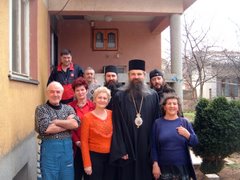Let's Avoid Another Kosovo Crisis
February 11, 2008.Source: The Wall Street Journal
Let's Avoid Another Kosovo Crisis
By RUTH WEDGWOODFebruary 9, 2008; Page A9
Small events in the Balkans have a way of getting out of hand, as Emperor Franz Joseph might once have remarked.
Thus, it is good news that Serbian voters defeated ultra-nationalist presidential candidate Tomislav Nikolic in last weekend's election, instead approving incumbent Boris Tadic for a second term. Mr. Tadic wants to link Serbia's future to the European Union.
But now it is the turn of the West to act with prudence and responsibility -- in particular on the incendiary issue of Kosovo, the southern province of Serbia that is home to Serb Orthodox Christians and ethnic Albanian Muslims.
In a strongly worded essay recently published in the Washington Times, former U.S. Secretary of State Lawrence Eagleburger, former Assistant Defense Secretary Peter Rodman and former U.N. Ambassador John Bolton expressed grave concern about the haste of the current Bush foreign policy team in encouraging Kosovo to declare unilateral independence. Their storm warning -- that such a declaration could cause violence in the province and lead to a crisis with Russia -- is worth heeding.
Kosovo has been part of the territory of Serbia since before the First World War, and its ancient monasteries are iconic to the Serbs. Belgrade's government coalition is already in crisis on the issue.
It is a dangerous precedent to tear apart the territory of a member state of the United Nations. And the timing could not be worse. No one needs a Kosovo crisis, while NATO remains short of troops in Afghanistan and maintains 16,000 troops in this autonomous province of Serbia. A Kosovo blowup would provide an easy excuse for gun-shy European allies to reduce their Afghanistan contingents.
Kosovo secessionists ignore economic realities. Kosovo has coal, lead and people, but it is stuck in a corner of Europe few tourists wander through. Some might visit its surviving Serbian Orthodox monasteries, but not while the place is in turmoil. Since Europe has proclaimed without grace that the European economic union is limited to Christian countries, Kosovo's best (and perhaps only) chance to join Europe's economy is to ride in as a part of Serbia.
Instead, Kosovo's secessionist leadership may well join the 57-member Organization of the Islamic Conference, as Albania already has done. This may bring financial assistance from the OIC, but the West should worry -- with aid comes political influence.
Kosovo's proclamation of independence would destabilize America's other friends in the Balkans. Bosnia will face a new attempt by the self-styled "Serbian republic" to leave the Dayton structure. Macedonia's restive ethnic Albanian minority may again ask why it is stuck in a state with Orthodox Slavs.
The effect in Central Europe would also not be benign. Hungary, Romania, Ukraine and Greece are home to irredentist minorities whose radical elements dream of redrawing maps. Nicosia faces a self-proclaimed "independent" Turkish republic of northern Cyprus. The Black Sea republic of Georgia, which we seek to bolster against Russian ambition, faces the claims of Abkhazia, a breakaway Muslim region in the north.
To be sure, one can appreciate why Kosovo Albanians are leery of Belgrade. From 1997 to 1999, Serbian president Slobodan Milosevic met the militant tactics of the Kosovo Liberation Army with a brutal police and military campaign, and after NATO intervened, he embarked on a bizarre and criminal exercise in ethnic cleansing, forcing tens of thousands of Muslim citizens out of their homes. The former Serbian president was tried for this crime and other outrages in the U.N. war crimes tribunal in The Hague.
But Milosevic is now dead, and Western policy should recognize the difference. Human rights activists in Serbia -- who stood up to Milosevic when it was dangerous to do so -- act with consistent principle in reporting the difficulties and dangers that will be imposed on Kosovo's substantial Serb minority.
There should be no false optimism or halcyon view of the province following the events of March 2004. Three ethnic Albanian children were killed in the northern town of Mitrovica, and afterwards anti-Serb rioting spread across the entire province, leading to the death of 19 civilians, another thousand civilians injured, and widespread burning of Serb houses, churches and monasteries. Independence will not cure this antipathy. It is hard to see how the NATO humanitarian intervention in 1999, designed to combat ethnic cleansing, is morally consistent with a new indifference to predictable counter-cleansing.
Smaller ethnic communities in Kosovo are also at risk, in the face of a recrudescent Albanian nationalism. The minority Muslim communities of Bosniaks, Gorani, Turks and Egyptians, along with the Ashkali and Roma, have faced violence and discrimination from the Albanian majority.
In negotiations on Kosovo's future, former Finnish president Martti Ahtisaari -- a respected international statesman -- has proposed an internationally-supervised government for Kosovo that would be akin to the Dayton Framework Agreement for Bosnia.
Kosovo's national political institutions would include representatives from each ethnic community. International officials would cast a deciding vote on the constitutional court and supervisory educational boards. Kosovo's Serbian communities could maintain relationships with the government of Serbia. There would be a continuing international military presence. And most tellingly, as in Bosnia, an "international civilian representative" could nullify local legislative and administrative decisions and remove non-compliant public officials. Only if conditions of stability were obtained would these guarantees be lifted.
But such a plan, as in Bosnia, requires a Chapter 7 resolution from the U.N. Security Council. It is unlikely, in the heat of independence, that a new state will willingly yield decisionmaking authority to an international auditor. And any Council resolution requires Russian acquiescence.
That leaves few options. Democratic states could demand that Kosovo adopt constitutional guarantees, in order to obtain international recognition. But there is no simple way of enforcing the promise. U.N. Security Council resolution 1244, dating from the NATO military campaign, does not address itself to a post-independence situation.
Sometimes a crisis focuses the mind. The president and the Secretary of State should consider a more practical option. America and its allies, acting through the Security Council, can provide a permanent international guarantee of Kosovo's political autonomy within the formal territory of Serbia. Combined with the Ahtisaari conditions, even Belgrade and Moscow are likely to accept such a guarantee.
This will give Kosovo as much, or more, than it would achieve through nominal independence. Autonomy can include the right to enter into certain types of international agreements. It can include the right to have international observer missions. Autonomy can entail more real power than is available to a neutered state, unable even to join the U.N. in the face of a Russian veto.
Even if Kosovo independence is ultimately unavoidable, there is much to be gained in securing the result in a way that Serbia and Russia can live with.
Ms. Wedgwood is a professor of international law and diplomacy at Johns Hopkins University



